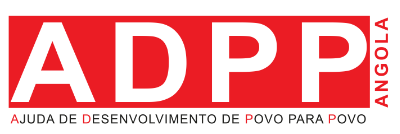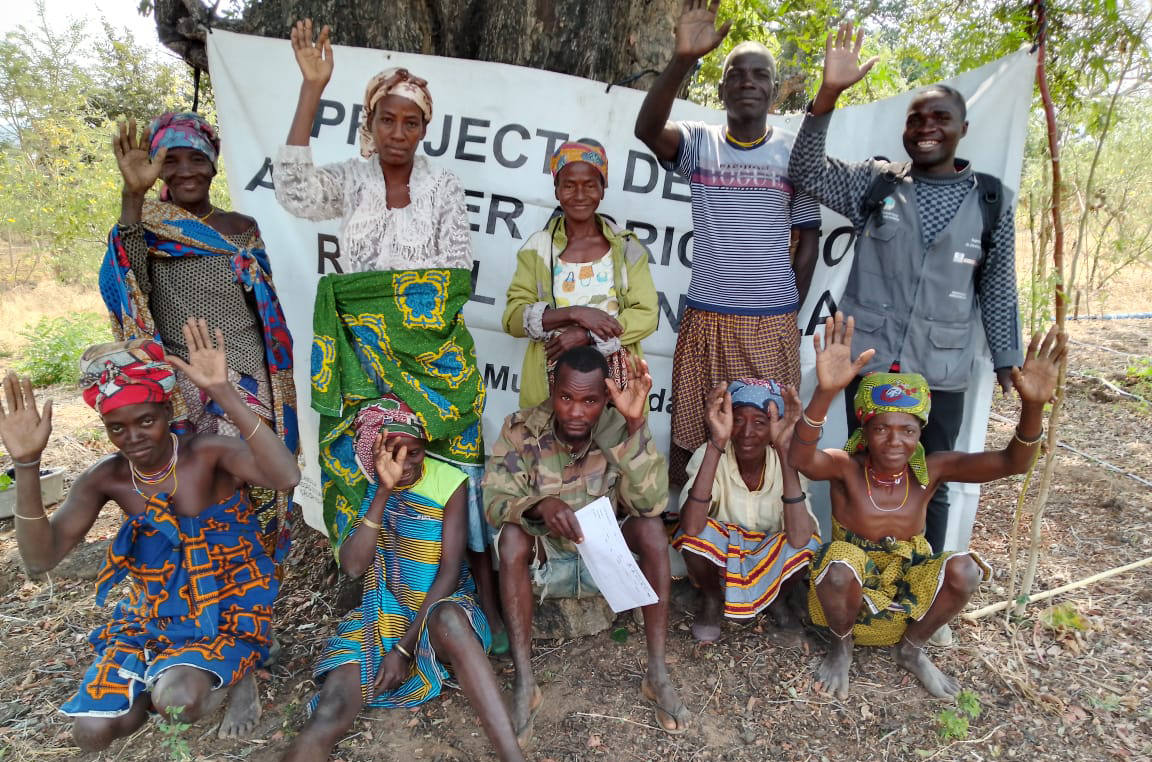
Through a public-private partnership, USAID is working with ExxonMobil, Azule Energy and Grupo Simples to increase economic opportunities for rural women in Angola, allowing them to fully participate in the economy as active citizens. With a focus on smallholder women farmers in rural areas, many of whom face economic and cultural barriers, the project assists participants in obtaining the basic tools needed to access employment, education, facilitate access to loans, and property. This includes providing knowledge and skills on how to secure land rights, improve literacy skills, increase agricultural productivity, and develop networks to address gender-based violence.
The Women in Angola Farming project is implemented by Ajuda de Desenvolvimento de Povo para Povo (ADPP), in close collaboration with the Government of Angola’s Ministries of Social Affairs, Education, Agriculture, and Justice and Human Rights. Covering 10 provinces, namely Malanje, Cuanza-Norte, Cuanza-Sul, Luanda, Huíla, Namibe, Benguela, Huambo, Bie and Cuando Cubango, this project is supported through USAID’s Gender Equity and Equality Action Fund, which was created to advance economic security for women and girls by increasing their access to resources, services and leadership opportunities and by addressing the barriers that limit their ability to participate fully in the economy.
ACTIVITIES
● Training for women farmers in conservation farming techniques to increase agricultural production;
● Literacy training via Farmers’ Clubs;
● Training in the Participatory Land Delimitation (PLD) methodology, facilitated by the Food and Agriculture Organization (FAO);
● Providing technical assistance on PLD to provincial and municipal authorities;
● Establishing 113 Farmers’ Clubs, providing technical assistance in management and finance;
● Assisting women with the registration processes to obtain identification (ID) cards and birth certificates for their children;
● Establishing Women’s Advocates networks in 120 communities, composed of both women and men, to promote an enabling environment for women’s empowerment;
● Developing radio programs on gender issues to better promote women’s empowerment.
ACCOMPLISHMENTS TO DATE
● 6,000 women farmers have improved agricultural techniques and declared a significant increase in the household income generation;
● 6,000 women smallholder farmers have increased their cultivation area from 0.9 hectares to 2.5 hectares of land
● 6,000 smallholder farmers are now collectively growing 14,800 hectares of land.
● 12,205 Farmers’ Club members are enrolled participating in the literacy program;
● 4,346 women farmers graduated with the equivalent of 4th grade and become functionally literate;
● 108 communities mobilized and organized to undertake the formalization process to obtain land titling;
● 2,320 farmers trained on land rights, assisting their communities to better understand their rights;
● 11,724 women farmers obtained official registration documents, including birth certificates and national IDs. These women, in turn, have mobilized 5,070 neighbors and community members to secure legal documents;
● 647 men and women trained as mentors on key gender-based violence prevention in their communities;
● 80,325 people reached via Women’s Advocates community radio programs.
● 116 communities benefited with awareness campaigns on key health messages, including reproductive health, water and sanitation and nutrition.
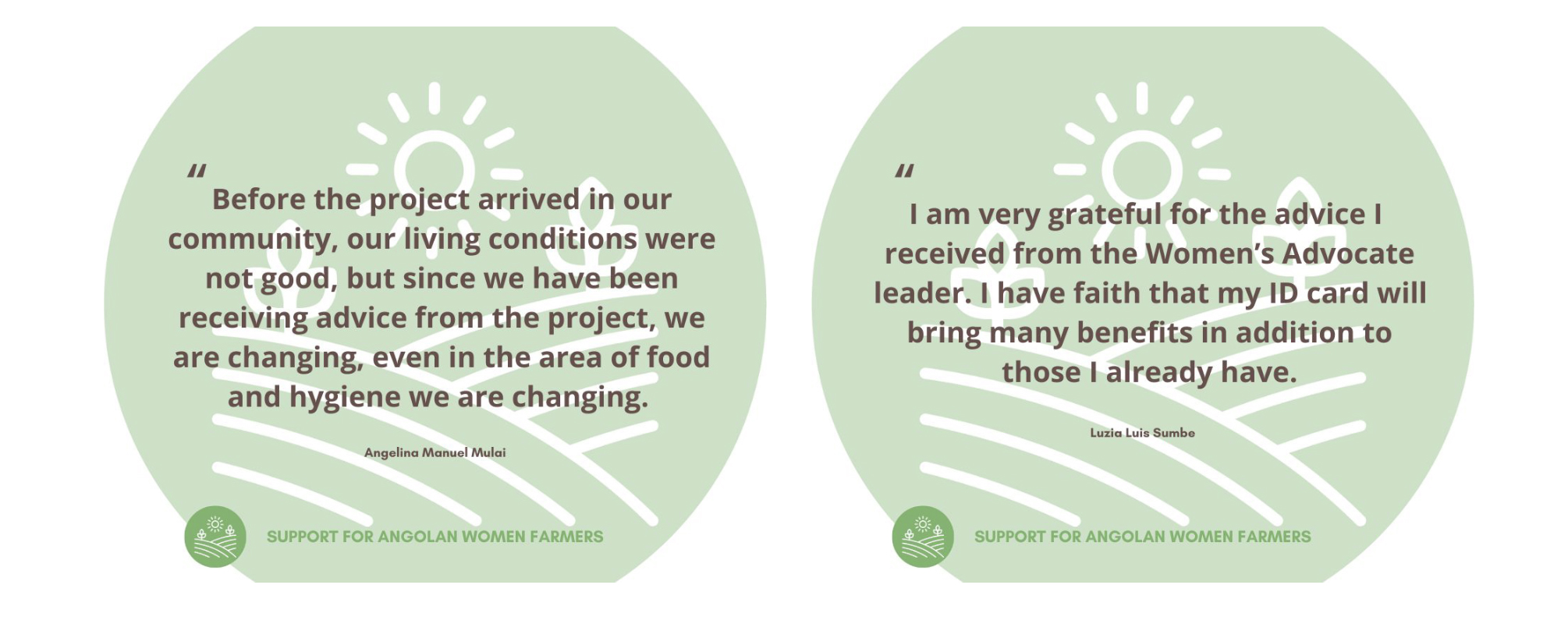

Click to read the article
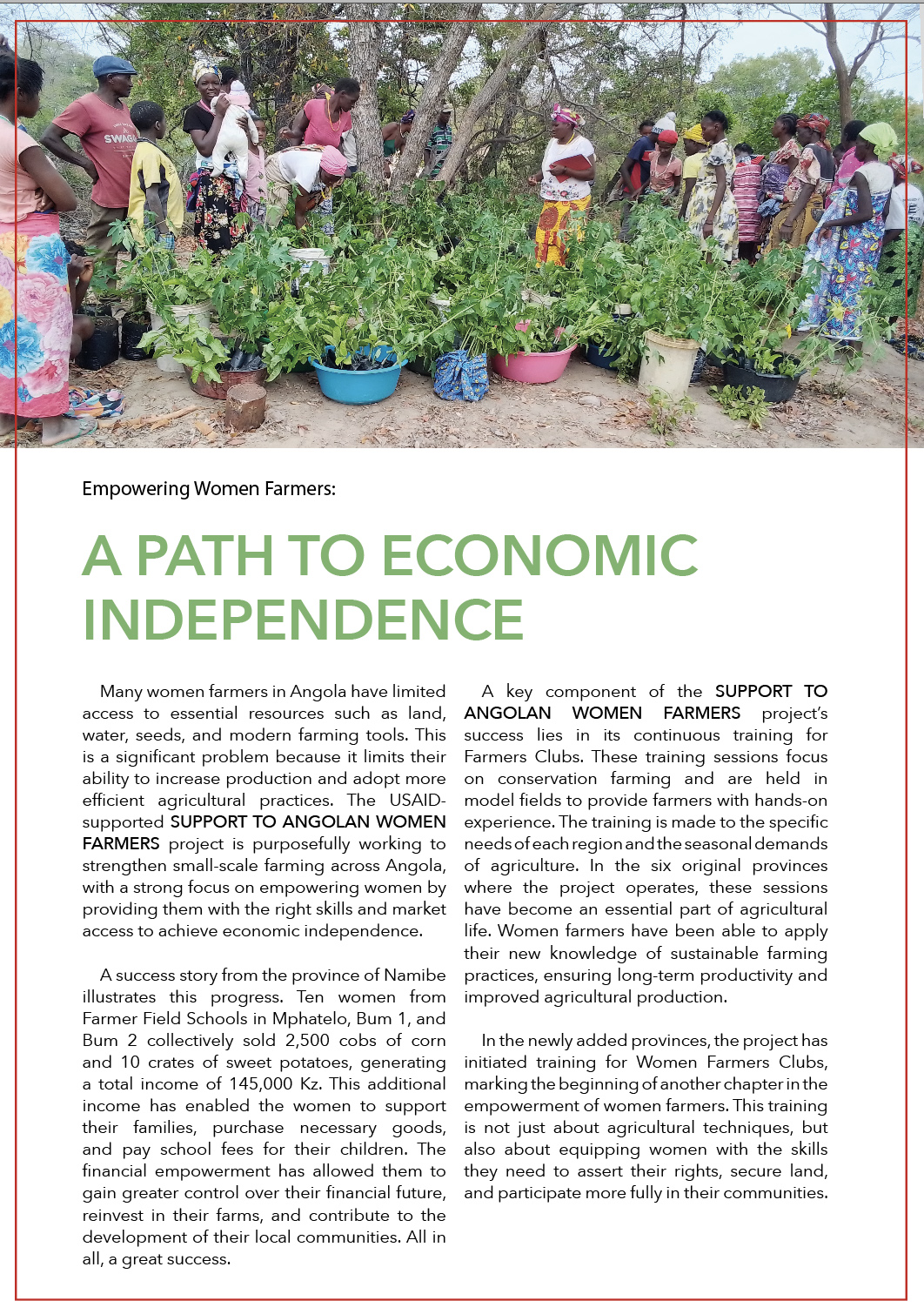

Improving the delivery of local services is a key component of the Government of Angola’s (GRA) efforts to decentralize the country’s services with special focus on social services. With an estimated two million children out of school due to systemic limitations, education is an important starting point for strengthening municipal systems for service delivery. To support the the GRA’s efforts the United States Agency for International Development (USAID), is funding the “Strengthening Municipal Education Systems (SMS) project” implemented by Ajuda do Povo para Povo, (ADPP) a local NGO, to strengthen the educational system and improve local service delivery in four provinces of Angola. The aim is to increase the percentage of school-aged children enrolled, improve the primary school completion rate, reduce school dropouts, and reduce the number of children repeating school years. To achieve these goals the SMS project focuses on working with local stakeholders, providing them with the tools for the successful implementation of the decentralization of services in the education sector. The SMS project provides tailored training to municipal authorities to maximize the use of resources allocated for the education sector and assist in developing municipal education strategies in Cacuso (Malanje), Londuimbali (Huambo), Catabola (Bie) and Baia Farta (Benguela). In addition, the SMS provides training to school managers on school management and administration, as well as training teachers on pedagogical skills and monitoring and evaluating learning outcomes.
ACTIVITIES
● Conduct a Municipal Education Mapping exercise to identify challenges and gaps and map available resources to address them;
● Develop a Municipal Education Strategy based on results of the mapping exercise;
● Support Municipal administrations to use the Municipal Education Mapping to develop costed Municipal Education Strategies;
● Develop COVID-19 mitigation plan to reduce the impact of discontinuance of classes;
● Community awareness campaigns to advocate for massive school-aged children’s enrollments;
● Support schools and teachers to implement activities for children struggling with schoolwork;
● Work closely with Ministry of Justice at local level to ensure children have the necessary registration documents to start school;
● Establishment of Parents Teachers Associations (PTAs) and support them to compile and present recommendations from the community to the local school, outlining proposals for community action to improve education.
● Facilitate communication between education authorities at the provincial and municipal levels;
● Use existing ADPP’s resources at the selected municipalities through its Teachers Training Schools to enable SMS activity support locally.
● Training of community members in the value of school-community cooperation, and participative M&E.
● Develop pedagogical methods and material adapted to the local context.
ACCOMPLISHMENTS TO DATE
● Strengthened the capacity of municipal authorities to maximize use of existing resources
● 1,083 school principals, administrators and teachers trained in school management
● 484 members of school leadership completed theoretical and practical human resources management, budgeting and maintenance training
● 645 schools with access to reliable data on attendance and passing rate
● 1,194 teachers trained in improved pedagogical skills and tools to monitor and evaluate the impact of their lessons
● Over 386,000 students in primary school reached through the project
● 204 schools report Monitoring and Evaluation (M&E) results to the community including Parents Teachers Associations, local leaders, parent meetings
● 1,354 trainee teachers have improved pedagogical skills and tools to monitor and evaluate the impact of their lessons
● 1,335 Parents Teachers Associations actively involved in primary education through the project
● 426 schools incorporated community inputs into school plans
● 48 municipal education officials complete professional development program
● Four municipalities have improved strategic plans for rural areas
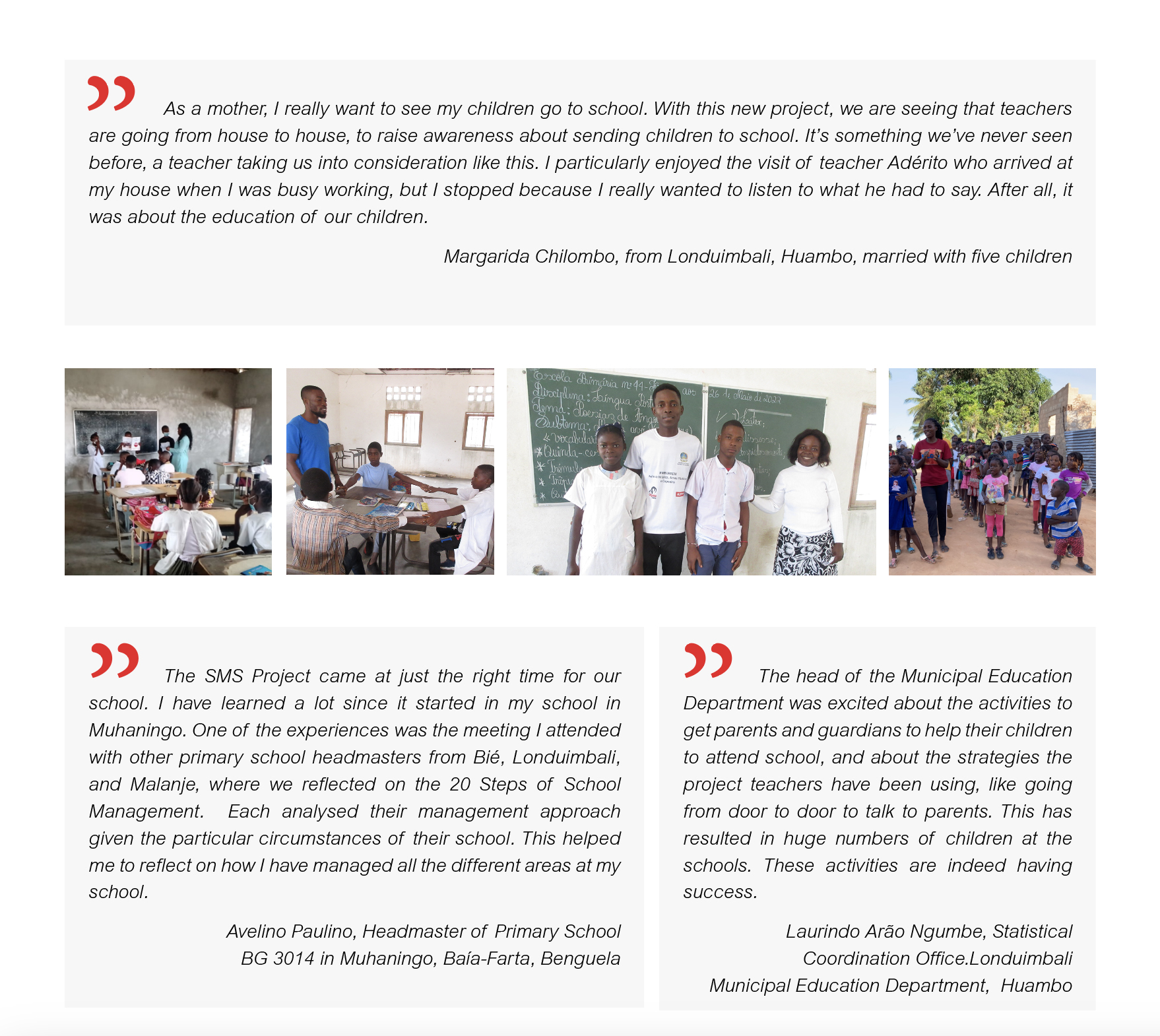
The overall objective of the project is to improve the quality of education for children, strengthening teachers' skills to face educational challenges and promote inclusion in rural areas. The project seeks to improve the educational environment, train teachers and improve the quality of teaching in primary schools. It also aims to a learning environment sensitive to gender issues, both within schools and in communities.
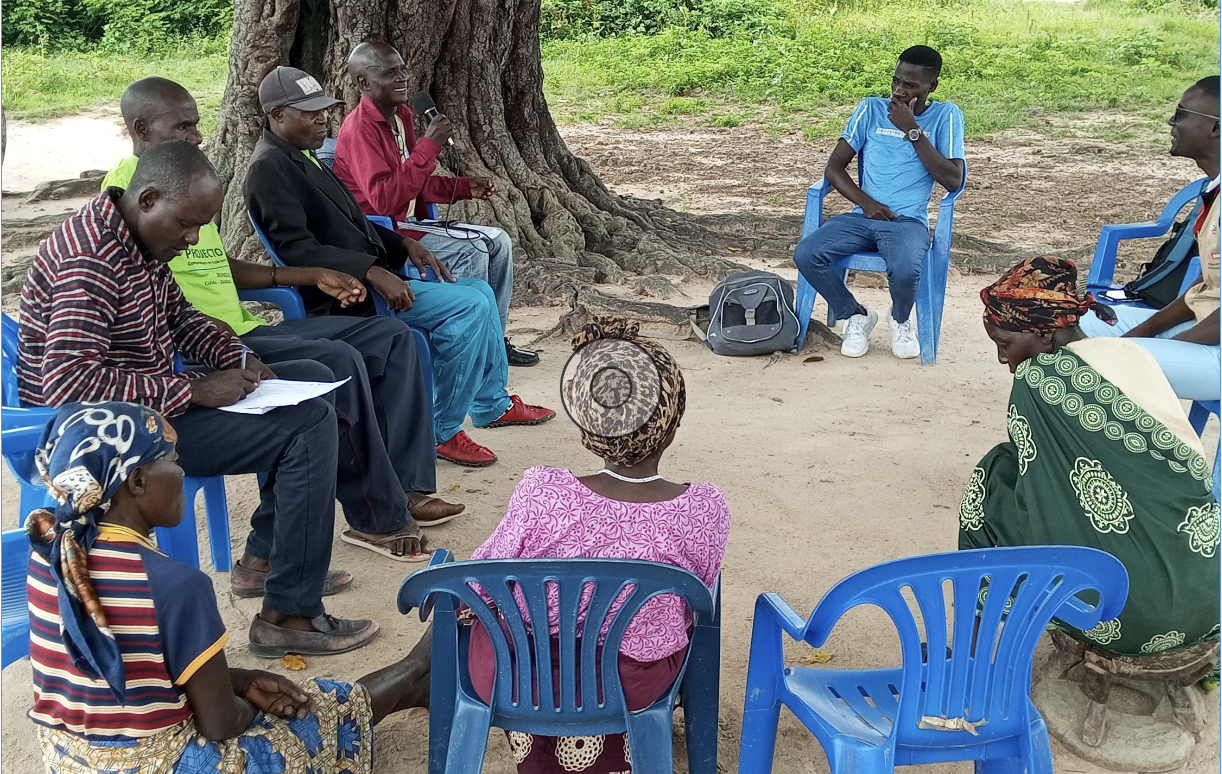
USAID’s Communities in Action for Peace and Inclusion (CAPI) project aims to enhance peacebuilding and conflict resolution skills among youth and adults in Benguela, allowing them to be more engaged citizens. The CAPI project works with high-risk populations to build trust, solidarity, and reconciliation through community engagement. Ajuda de Desenvolvimento de Povo para Povo (ADPP), an Angolan NGO, developed a peer-to-peer program for Benguela province that engages youth and children who are vulnerable and marginalized in their communities, many of whom suffered from political violence.
ADPP incorporates these young people into youth clubs where they are provided with peacebuilding and conflict resolution training, literacy skills, and assistance in obtaining birth registration and identification (ID) cards, which allow them to vote among other civic prerogatives. The CAPI project also engages with adults from diverse political backgrounds, to address shared interests which promote more peaceful and inclusive communities.
ACTIVITIES
● Provide literacy skills among marginalized youth and children;
● Establish Community Action Groups (CAG) to implement community-driven development micro projects;
● Train local leaders in conflict resolution, peacebuilding, and leadership;
● Engage communities of diverse political backgrounds in micro projects to help relieve economic and other hardships that help create conditions for instability in Benguela;
● Increase community-government dialogue to build and enhance relationships;
● Empower women as peacebuilders to act as conflict resolution leaders in the most unstable communities;
● Train youth in peacebuilding skills and conflict resolution.
ACCOMPLISHMENTS TO DATE
● 26,718 youth and children who improved their conflict resolution skills;
● 45 young clubs established to educate youth on conflict resolution
● 2,654 youth trained in entrepreneurship
● 6,247 youth obtained birth certificates and/or national ID cards;
● 39 communities impacted with income generating activities
● 27,488 children participate in school-based peace education;
● 5791 youth receive peace/conflict education training/information via Youth Clubs;
● 18,975 youth register to vote;
● Approximately 6,000 youth participate in accelerated learning;
● 84 Primary schools implementing Peace Education;
● 45 communities implementing actions to resolve land disputes, including recognition of women rights to land;
● 145 communities benefit from micro project broadcasts on peacebuilding and conflict resolution;
● 83 local leaders in the communities who participate in conflict resolution actions;
● 128 religious leaders trained on peacebuilding and conflict resolution skills;
● 293 local government officials trained on conflict management and gender-based violence;
● 5,108 community members trained in gender-based violence prevention;
● 43,000 people reached by a dedicated radio show broadcast on peacebuilding and conflict resolution.
● 1,171 community members actively involved in community and government dialogue forums.

The ADWAC project focuses on increasing the resilience and adaptation capacity of communities in the transboundary region of southern Angola and northern Namibia, which faces worsening droughts due to climate change.
The project's main goals include improving local and regional climate adaptation capacities, enhancing climate-resilient farming and water management, and strengthening food security for vulnerable rural communities. Expected outcomes include better climate risk awareness, increased agricultural productivity, improved livelihoods for 10,000 smallholder farmers, and reduced vulnerability to drought.
Read more on the project's website here or the Adaptation Fund's website here



